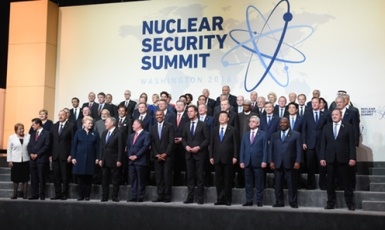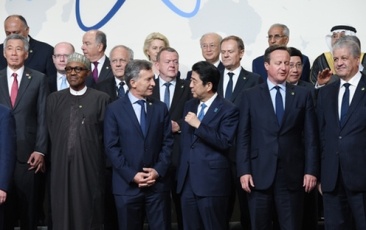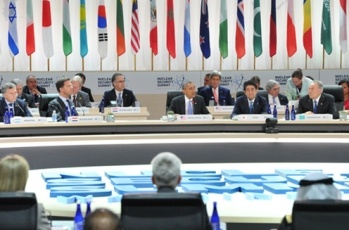Nuclear Disarmament and Non-Proliferation
Prime Minister Abe Attends the Nuclear Security Summit in the United States
April 2, 2016
 Photo: Cabinet Public Relations Office
Photo: Cabinet Public Relations Office
 Photo: Cabinet Public Relations Office
Photo: Cabinet Public Relations Office
 Photo: Cabinet Public Relations Office
Photo: Cabinet Public Relations Office
The Nuclear Security Summit took place in the United States (Washington D.C.) from March 31 to April 1, and Mr. Shinzo Abe, Prime Minister of Japan, attended on behalf of Japan. The overview of the trip and evaluation is as follows.
- 1 Working dinner (March 31 night)
- 2 Opening session (April 1 morning)
- 3 Working lunch (April 1 noon)
- 4 Closing session (April 1 afternoon)
- 5 Evaluation
1 Working dinner (March 31 night)
(1)Leaders exchanged opinions on the theme of ''Evaluating the Threat to Nuclear Security''. Participating countries confirmed the need for cooperation to strengthen nuclear security and thereby prevent the threat of nuclear terrorism from becoming a reality, particularly in light of recent global terrorism with frequent terrorism incidents.
(2)Prime Minister Abe touched on recent terrorism incidents, including the terror attacks in Brussels, and called for solidarity by countries around the world and resolute combat against terrorism. He also commented that North Korea's nuclear test and ballistic missile launches and repeated provocative language and actions cannot be overlooked and that Japan intends to cooperate with the international community in strictly implementing the recently adopted Security Council resolution and Japan's own sanctions. He explained Japan's efforts to address new threats, such as cyber-attacks.
(2)Prime Minister Abe touched on recent terrorism incidents, including the terror attacks in Brussels, and called for solidarity by countries around the world and resolute combat against terrorism. He also commented that North Korea's nuclear test and ballistic missile launches and repeated provocative language and actions cannot be overlooked and that Japan intends to cooperate with the international community in strictly implementing the recently adopted Security Council resolution and Japan's own sanctions. He explained Japan's efforts to address new threats, such as cyber-attacks.
2 Opening session (April 1 morning)
Leaders held a candid discussion of their initiatives on the theme of ''National Actions to Enhance Nuclear Security.'' The overview of comments from Prime Minister Abe's keynote speech is as follows.
- Nuclear Security in Japan is closely linked to the severe accident at the Fukushima Daiichi Nuclear Power Station. On the occasion of the fifth anniversary of the Great East Japan Earthquake, I would like to extend my heartfelt gratitude to all of you for the warm support we have received from all over the world.
- Based on our experience of this severe accident, Japan developed new regulatory requirements, which are the most stringent in the world. It is Japan's mission to share the lessons learned with all countries in order to expand the safety of nuclear power plants and the knowledge of counter measures in the case of an accident. Japan actively continues to engage in human resource development, assistance to other countries, and international cooperation on safety standards.
- It is necessary to ensure complete transparency in order to continue the peaceful use of nuclear energy into the future. Japan continuously strives to lead the world in enhancing the transparency of civil nuclear energy in the world.
- With regard to the appropriate management of plutonium, Japan implements the policy of ''not possessing plutonium reserves for which the purpose of utilization is unspecified.'' As the result of the close cooperation between Japan and the United States, we have completed the removal of all nuclear fuel from the Fast Critical Assembly (FCA) of the Japan Atomic Energy Agency (JAEA), which was pledged at the Nuclear Security Summit in The Hague.
- As an additional commitment, I decided to convert the Kyoto University Critical Assembly (KUCA) from HEU to LEU fuel and to remove all HEU fuel. Japan releases our commitments to contributing to the enhancement of the nuclear security of the world as a message to the international society in Japan-US Joint Statement.
3 Working lunch (April 1 noon)
On the theme of ''International and Institutional Actions to Strengthen Nuclear Security,'' various countries expressed high expectations for the International Atomic Energy Agency (IAEA) to have a central role in international coordination after the completion of the Nuclear Security Summit. Prime Minister Abe cited the growing importance of the IAEA's initiatives for improving nuclear safety and transparency and emphasized Japan's intention to cooperate to achieve further advances by the IAEA's activities to strengthen nuclear security under the leadership of Mr. Yukiya Amano, Director General of the IAEA. Additionally, Prime Minister Abe mentioned Japan's human resource training activities in the nuclear security field and reinforcement of measures to prevent nuclear terrorism ahead of international events, such as the G7 Ise-Shima Summit and the Tokyo Olympics and Paralympics.
4 Closing session (April 1 afternoon)
Leaders engaged in a discussion of responses to the theft of radioactive materials based on a fictional scenario and conducted lively discussion of ways to address the real threat posed by ISIL and other terrorists. In the closing session, leaders issued a Summit Communiqué and agreed to five Action Plans for the United Nations, IAEA, and other international organizations and initiatives in order to continue strengthening nuclear security following the Summit’s conclusion.
5 Evaluation
(1) Evaluation of the Nuclear Security Summit
Around 40 top leaders from 53 countries and three international organizations participated in this Nuclear Security Summit, which is the final one, and these leaders shared an awareness that the threat of nuclear terrorism by ISIL or other international terrorist organizations is a pressing issue that needs to be addressed by international society as a whole, particularly in light of the terror attacks in Belgium and other locations, and reconfirmed the necessity of various countries working together and adopting detailed measures.The four Nuclear Security Summits that have taken place raised awareness of nuclear terrorism and contributed to conclusions of the Amendment to the Convention on the Physical Protection of Nuclear Material (CPPNM) by 102 countries, a two-thirds majority of all state parties of the current CPPNM required for entry into force. They also promoted global initiatives for the reinforcement of nuclear security, including minimization and enhanced protection of nuclear materials in various countries.
(2) Japan's contributions and initiatives
Various countries, including the United States as the chair, reacted favorably to Japan's completion of the removal of all FCA nuclear fuel and decision to remove highly enriched uranium fuel from KUCA by converting this facility to low enrichment as measures to minimize and properly manage nuclear materials. Japan also demonstrated specific contributions to the reinforcement of global nuclear security with its domestic efforts, such as promotion of measures to prevent nuclear terrorism ahead of the G7 Ise-Shima Summit and the Tokyo Olympics and Paralympics.Additionally, Japan emphasized a desire to actively contribute to global nuclear safety in light of lessons learned from the nuclear accident and the necessity of securing transparency to continue the peaceful use of nuclear power.
Furthermore, the issuance of a Japan-U.S. Joint Declaration, including the commencement of negotiations on a framework to enable the exchange of classified information in the area of nuclear security, confirmed the relationship of cooperation between Japan and the United States in the nuclear security area and demonstrated the leadership of Japan and the United States in strengthening global nuclear security.

